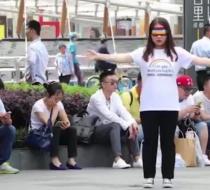LGBT activists ask strangers for hugs in China protest at Weibo censorship Favorite
A social experiment testing the public’s reaction to gay people in China has gone viral.
The blindfolded activists stood in public wearing T-shirts that said “I’m gay would you hug me?” and video of the protest then spread rapidly on Weibo, a hugely popular social media platform in China.
The social experiment follows a recent announcement by Weibo to ban gay content on its platform of 400 million active users.
Weibo said on April 13 that it would remove all gay-themed cartoons and videos alongside pornographic and violent material in a bid to “clean up” the platform.
The decision led to the removal of over 56,000 posts removed and received fierce backlash from LGBT activists.
Many Weibo users began protesting the move by posting messages with the hashtag #IAmGay, which quickly began trending hours later.
The platform was flooded with over 170,000 posts before the ban was reversed just three days later.
One protest took the form of this video that shows LGBT activists challenge strangers to hug them in the street.
hile some people walked past in surprise, others proudly stepped forward to hug the LGBT activists.
The video has been shared over 283,000 times on Weibo, sending a clear message of LGBT acceptance.
The activist who created the stunt reportedly said: “If I don’t say anything now, then there won’t be a chance to say anything in the future.”
Weibo has since committed to reversing the ban, stating: “The clean-up is no longer targeted at homosexual content, and is mainly to clean up the subjects related to pornography and violence. Thank you for your discussion and suggestions.”
This is a welcome surprise for the LGBT community in China, where homosexuality is not illegal but was only removed from the official list of mental disorders in 2001.
The Beijing LGBT Center told PinkNews: “What they do is definitely discrimination to LGBT community and hurts LGBT rights.
“Quickly our Beijing LGBT Center also posted protest contents in our official social media with hashtags#IAmGay #IAmGayIRefuseToBeCleanUp to join this campaign and make voices for the community.
“I think it’s a small victory for our protests – [the] LGBT community and LGBT-friendly people are encouraged by this news.
“On the other hand, we are still waiting for the detailed explanation of the announcement by Weibo official, list of accounts deleted due to homosexual content ban and a written apology for the reputation, moral and material damage caused to these accounts.”
The ban reversal also saw relief among Twitter users, as one person Tweeted: “Weibo declared that postings about homosexuality are no longer banned.
The Chinese government has previously attempted to ban portrayals of homosexuality on television.
A media watchdog said that “immoral, vulgar and unhealthy” portrayals of homosexuality were banned alongside smoking, drinking alcohol, suggestive clothing and the idea of reincarnation.
Despite multiple attempts to censor the LGBT community online, China is home to gay app Blued, which claims to be the largest gay social network app in the world with more than 27 million users.
Meanwhile, Grindr was recently also acquired by a Chinese tech giant.






